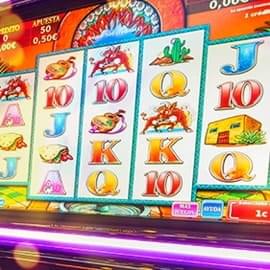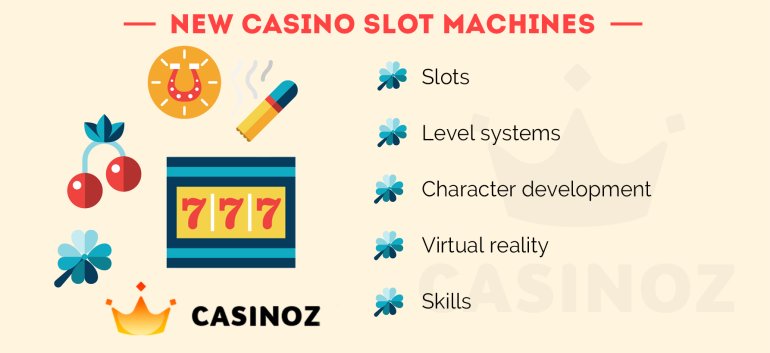How Are Slot Machine Payouts Calculated
Posted By admin On 11/04/22- How slot machines work – and why you should think twice before playing them. For example, if a player bets $1, spins the reels and receives no payout, that’ll be the price – not 10 cents.
- Of the payouts on a machine. It is presented on the PAR wo rk s heta numb. T g, mor v l at ihc n s. For example, say that a customer inserts a $100 bill and plays $100 of credits on a machine. According to the PAR worksheet, the theoretical payback percentage is 92%. If the machine behaves perfectly (which would most likely not be true in real.
- All machines have one thing in common: The longer the machine is played, the closer the actual payouts will be to the theoretical results. Slot machines use a random selection process to achieve a set of theoretical odds.
Remember the movie National Lampoon’s Vegas Vacation, when gambling fever consumes Chevy Chase’s character, Clark W. Griswold? He goes on a losing streak to beat all losing streaks while his son, Rusty, wins four cars by playing the slot machines. Maybe Clark would have done better if he had read Probability For Dummies! In this article, you discover the basic ideas behind slot machines and how they work, so that you can get past the myths and develop a strategy based on sound probability.
How Are Slot Machine Payouts Calculated Cash
Understanding average payout
When casinos advertise that their slot machines pay out an average of 90 percent, the fine print they don’t want you to read says that you lose 10 cents from each dollar you put into the machines in the long term. (In probability terms, this advertisement means that your expected winnings are minus 10 cents on every dollar you spend every time the money goes through the machines.)
Suppose you start with $100 and bet a dollar at a time, for example. After inserting all $100 into the slot, 100 pulls later you’ll end up on average with $90, because you lose 10 percent of your money. If you run the $90 back through the machine, you’ll end up with 90 percent of it back, which is 0.90 x 90 = $81. If you run that amount through in 81 pulls, you’ll have $72.90 afterward (0.90 x 81 = 72.90). If you keep going for 44 rounds, on average, the money will be gone, unless you have the luck of Rusty Griswold!
A slot machine has 5 reels and displays 3 symbols per reel (no spaces or 'empty' symbols). Payout can occur in a number of ways. A special diamond symbol appears 3 Lucky 7's app.
How many pulls on the machine does your $100 give you at this rate? Each time you have less money to run through the machine, so you have fewer pulls left. If you insert $1 at a time, you can expect 972 total pulls in the long term with these average payouts (that’s the total pulls in 44 rounds). But keep in mind that casinos are designing slot machines to go faster and faster between spins. Some are even doing away with the handles and tokens by using digital readouts on gaming cards that you put into the machines. The faster machines can play up to 25 spins per hour, and 972 spins divided by 25 spins per minute is 38.88 minutes. You don’t have a very long time to enjoy your $100 before it’s gone!
The worst part? Casinos often advertise that their “average payouts” are even as high as 95 percent. But beware: That number applies only to certain machines, and the casinos don’t rush to tell you which ones. You really need to read or ask about the fine print before playing. You can also try to check the information on the machine to see if it lists its payouts. (Don’t expect this information to be front and center.)
Implementing a simple strategy for slots
Advice varies regarding whether you should play nickel, quarter, or dollar slot machines and whether you should max out the number of coins you bet or not (you usually get to choose between one and five coins to bet on a standard slot machine). In this section, you’ll find a few tips for getting the most bang for your buck (or nickel) when playing slot machines.
Basically, when it comes to slot machines, strategy boils down to this: Know the rules, your probability of winning, and the expected payouts; dispel any myths; and quit while you’re ahead. If you win $100, cash out $50 and play with the rest, for example. After you lose a certain amount (determined by you in advance), don’t hesitate to quit. Go to the all-you-can-eat buffet and try your luck with the casino food; odds are it’s pretty good!
Choosing among nickel, quarter, and dollar machines
The machines that have the higher denominations usually give the best payouts. So, between the nickel and quarter slots, for example, the quarter slots generally give better payouts. However, you run the risk of getting in way over your head in a hurry, so don’t bet more than you can afford to lose. The bottom line: Always choose a level that you have fun playing at and that allows you to play for your full set time limit.


Deciding how many coins to play at a time
When deciding on the number of coins you should play per spin, keep in mind that more is sometimes better. If the slot machine gives you more than two times the payout when you put in two times the number of coins, for example, you should max it out instead of playing single coins because you increase your chances of winning a bigger pot, and the expected value is higher. If the machine just gives you k times the payout for k coins, it doesn’t matter if you use the maximum number of coins. You may as well play one at a time until you can make some money and leave so your money lasts a little longer.
For example, say a quarter machine pays 10 credits for the outcome 777 when you play only a single quarter, but if you play two quarters, it gives you 25 credits for the same outcome. And if you play the maximum number of quarters (say, four), a 777 results in 1,000 credits. You can see that playing four quarters at a time gives you a better chance of winning a bigger pot in the long run (if you win, that is) compared to playing a single quarter at a time for four consecutive tries.
The latest slot machine sweeping the nation is the so-called “penny slot machine.” Although it professes to require only a penny for a spin, you get this rate only if you want to bet one penny at a time. The machines entice you to bet way more than one penny at a time; in fact, on some machines, you can bet more than 1,000 coins (called lines) on each spin — $10 a shot here, folks. Because these machines take any denomination of paper bill, as well as credit cards, your money can go faster on penny machines than on dollar machines because you can quickly lose track of your spendings. Pinching pennies may not be worth it after all!

Sorry about the delay since my last posting. I’ve been hard at work reading slot machine manufacturer specification sheets, and also playing the slots in my local casino – so that I can now bring you a list of slot machine payout cycles / volatility. I don’t believe you’ll find this information elsewhere! I researched it, I’ve prepared it (as I do with ALL content on this site) – so if by chance it ends up appearing somewhere else on the Internet going forward, remember where you saw it FIRST. Here!
To my mind there are three main types of slot machines. Those that have Frequent Hits and Modest Wins, those with Mid-range Hits and Medium Wins, and those with Less Frequent Hits and Larger Wins. I’ve arranged my list / tables with this in mind. I’ve considered slot machines from multiple slot machine manufacturers: IGT, Aristocrat, WMS, Bally, etc to try and provide a comprehensive listing. That said, I’m only featuring about 100 slot machines here – and there are many many thousands of slot machine varieties out there… still, it’s a start right?
If you’re a small recreational slot player, sticking with Frequent Hits and Modest Wins machines will lower your risk of going broke early. Middle of the road slot players with a few hundred dollars of bankroll might enjoy the Mid-range Hits and Medium Wins machines. Only serious / well bankrolled players should ideally play the Less Frequent Hits and Larger Wins slot machines – these are VERY volatile!
Enjoy the listing, and feel free to send me your comments or an email.

Slot machines with FREQUENT HITS and MODEST WINS
50 Lions
Black Rhino
Canary Riches
Heart of Gold
Incan Pyramid
Love Birds
Macaw Magic
Money Storm
Money Tree
Outback Jack
Ramses Prox
Where’s The Gold
Wild Cougar
Wild Goose
Wild Jungle
Slot machines with MID-RANGE HITS and MEDIUM WINS
Adonis
Aloha Magic
Arabian Jewels
Buccaneer
Corrida De Toros
Desert Gold
Dolphin Treasure
Geisha
Get Eggcited
Golden Canaries
Golden Gong
Golden Pyramids
Good Fortune
Grizzly
Helen Of Troy
Hollywood Dreams
House of Hearts
Jungle Jive
King of Neptune
King of The Nile
Koala Mint
LA Gator
Lucky Jack
Miss Kitty
Money Beans
Money Bears
Monkey In The Middle
Moon Festival
Moulin Nights
Musketeer
Mystic Mermaid
Nerds Gone Wild
Orchid Mist
Owl Capone
Oz Great Chase
Oz Jungle
Oz Lost City
Oz Safari
Panther Magic
Pelican Pete
Penguin Pays
Pot of Gold
Queen of The Nile
Rapid Riches
Return of the Samurai
Roll Up Roll Up
Seal The Deal
Show Me The Money
Spring Carnival
Super Stars
Superbucks 2
Superbucks 3
Superbucks 4
Sweet Hearts II
Triple Tigers
Venetian Nights
Viking Warrior
White Russia
Wicked Winnings
Wild Hearts
Wild Thing
Winning Streak
How Are Slot Machine Payouts Calculated Money
Slot machines with LESS FREQUENT HITS and LARGER WINS
5 Dragons
Anthony & Cleopatra
Big Ben
Brazil
Centurion
Choy Sun Doa
Crystal Springs
Dragon Lord
Dream Catcher
Fire Dancer
Fox On The Run
Genghis Khan
Golden Incas
Inca Chief
Inca Sun
Indian Dreaming
Island Delight
Kakadu Dreaming
Line King
Magician
Ms Foxy Fortune
Mystic Chief
Mystic Power
Peacock Magic
Phoneix Fantasy
Pompeii
Pride Of Africa
Queen Of Sheba
Red Baron
Star Drifter
Sun Queen
Temple Of Zeus
Tiki Torch
Water Margin
Whales Of Cash
Wild Africa
Wild Ways
Wings Over Olympus
Zorro